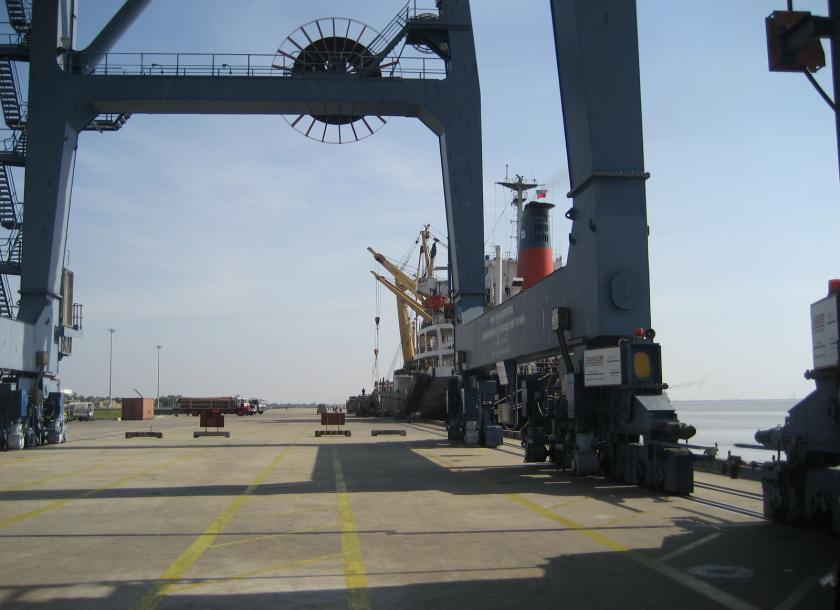Yanghee Lee, Special Rapporteur on the Situation of Human Rights in Myanmar, states that SEZ impact on communities must be addressed
24 ตุลาคม 2560
INVESTORS and developers of Special Economic Zones (SEZs) have responded to criticisms from the Special Rapporteur on the Situation of Human Rights in Myanmar, who stated that all SEZs in the country have adversely affected communities.
Kyaukphyu’s chief investor said it is the government’s responsibility to resolve the concerns related to land acquisition, while the Thilawa SEZ developer highlighted the initiatives to facilitate communications with residents.
Myanmar currently has one SEZ in operation – Thilawa SEZ in southern Yangon, while SEZs are proposed in Dawei in Tanintharyi Region and Kyaukphyu in Rakhine State.
In a report providing an overview of human rights developments in Myanmar up to August 25 released last month, Yanghee Lee, Special Rapporteur on the Situation of Human Rights in Myanmar, said that development is integral to the future prosperity of the country but “it is important that development proceeds in a sustainable way which respects local communities’ rights”.
The report went on to comment on the situation in the SEZs, saying that all SEZs in the country had affected communities negatively.
“During her visit, Ms Lee met civil society and communities affected by the three special economic zones in Yangon, Dawei and Kyaukphyu, which she visited. For all three zones, communities reported that initial phases or preparatory work had had a largely negative impact on their lives, with many of those affected still suffering negative consequences.
“Civil society organisations have also raised concerns that the projects have not been implemented in accordance with the law,” the report stated.
Ms Lee stressed that the projects need to proceed in the correct order required by the law – with environmental impact assessments being undertaken before the issuance of permits to developers and prior to land acquisition and construction beginning.
“Only after this should resettlement plans be drawn up and completed before any land is confiscated or communities moved, as required by the environmental impact assessment procedures,” she argued, adding that transparency and consultation are vital for communities.
Local communities should also be “given the opportunity to suggest alternative options” in the projects.
Several communities told the Special Rapporteur that they understood that the country needed to develop but felt that they would pay the price, with no benefits seen by their community, according to the publication. Efforts to ensure that local communities attain tangible benefits could help change this sentiment. Steps should also be taken to ensure access to remedy through appropriate mechanisms for those previously negatively affected.
Ms Lee recognised that many bodies may face limited capacity, but would encourage them to seek international assistance to ensure that projects are planned, reviewed and developed in accordance with the national law.
The Special Rapporteur touched on the situation in Kyaukphyu, which is the site for a proposed SEZ, consisting of an industrial park and a deep-sea port.
“Madei [Made] community members in Rakhine State also felt that they received few benefits from the port and pipeline built on the island and instead faced severe difficulties as boats, including for fishing and transportation, are prohibited for several days when tankers dock at the port.
“The Special Rapporteur was told by one individual in Kyaukphyu that, before losing his land, he could feed his family and sell the surplus to raise income but that, following its confiscation, forced to take sporadic work, he is struggling to make ends meet,” the report said.
Land acquisitions
Yuan Shaobin, executive president of CITIC Myanmar, which leads the Kyaukphyu foreign consortium, told The Myanmar Times that land acquisition activities had not taken place in Kyaukphyu, and that community consultation, resettlement plans and land acquisitions are all responsibilities of the government, not investors. The consortium is, essentially, only paying for the cleared land.
… still we see land acquisition and relocation planning occurring [in SEZs] without transparency and in violation of national laws.
- Sean Bain, ICJ
The management team of Myanmar-Japan Thilawa Development (MJTD) responded to The Myanmar Times via email that the SEZ was developed in a manner which complied with the law and international standards. MJTD, a joint venture between Japan and Myanmar, is in charge of development and management of Myanmar’s first SEZ.
“Thilawa SEZ is being developed in strict accordance with Myanmar law and proper international standards are followed throughout. In addition, MJTD together with Thilawa SEZ’s locators have been contributing in improving local facilities as well as job opportunities in the township,” MJTD said.
“However, we recognise that building infrastructure and better facilities can cause short-term disruption to local residents. To ensure we understand these concerns and respond appropriately, our community engagement structure includes not just quarterly coordination meetings but also frequent home visits where issues can be raised directly with us,” it added.
The developer highlighted the initiatives used to facilitate communications with affected communities.
“We have also set up a ‘Community Diary’ that recorded how MJTD responds openly and transparently to requests from local residents. Such initiatives ensure we stay as closely in touch with local residents as we can and our record of positive response and activity underlines that reality.”
Sean Bain, legal consultant from the International Commission of Jurists (ICJ) in Myanmar, said that land acquisition activities still take place before related assessments are properly conducted.
“The SEZ authorities are well aware that a site-wide environmental impact assessment is required before other preparatory works. But still we see land acquisition and relocation planning occurring without transparency and in violation of national laws.
“Evidently human rights in Myanmar’s SEZs are now getting international attention. If the government does not address these issues, it is likely to discourage responsible investors and perhaps encourage unscrupulous investors seeking to take advantage of lax law enforcement,” he commented.
(The Myanmar Times: https://www.mmtimes.com/news/sez-impact-communities-must-be-addressed-yanghee-lee.html )











